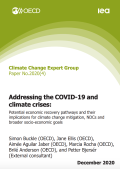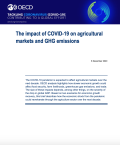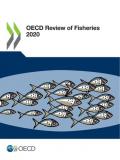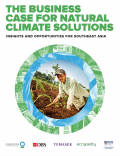
This paper provides decision-makers with a framework for prioritising different economic, social and environmental goals and analysing the options available to achieve them. To this end, it develops three stylised COVID-19 recovery pathways (“Rebound”, “Decoupling” and “Wider well-being”) that differ in the extent to which they encompass greenhouse gas (GHG) emission reductions and the integration of mitigation and wider well-being outcomes or, broadly equivalently, SDGs.

The COVID-19 pandemic is expected to affect agricultural markets over the next decade. OECD analysis highlights how slower economic growth could affect food security, farm livelihoods, greenhouse gas emissions, and trade. The size of these impacts depends, among other things, on the severity of the drop in global GDP. Based on two scenarios for economic growth recovery, this brief describes how the economic shock from the pandemic could reverberate through the agriculture sector over the next decade.

This report aims to support policy makers and sector stakeholders in their efforts to deliver sustainable and resilient fisheries that can provide jobs, food, and livelihoods for future generations.

This report highlights opportunities for businesses to invest in Natural Climate Solutions (NCS) – particularly those in Southeast Asia – to stimulate the implementation of NCS at scale.
With a focus on wastewater, this publication presents a range of solutions to reduce plastic and microplastic pollution from the source to the sea. It also encourages policymakers and practitioners to set priorities and select those that are more cost-effective and suitable for their local context. Finally, it stresses the importance of having technical solutions in addition to appropriate legislation, economic instruments, education, and awareness that force real change on the ground.
